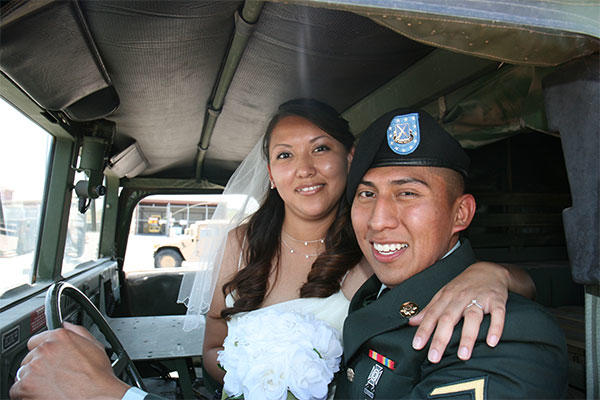A new study shows military members may marry young for more than just the income boost.
The study, conducted by military researcher Jennifer Lundquist from the University of Massachusetts Amherst, found that the reasons behind the military's tradition of young marriage may have more to do with permanent change of station (PCS) moves and deployments than a bigger paycheck.
"While previous explanations for high military marriage rates have focused primarily on the incentives provided by housing benefits for married couples, housing benefits are but a small piece of the puzzle," Lundquist said.
Military members receive a pay increase when they marry thanks to the basic housing allowance (BAH) allotment. Those who would otherwise live in the barracks start receiving BAH if they marry, and those who already receive it are given a larger amount if they are supporting a spouse or other dependents.
The marriage age for civilians has steadily increased over time, but military members are still marrying at the same age as the typical civilian did in the 1950s, Lundquist said. While only 31 percent of civilians between age 23 and 25 had been married at some point, according to 2011 Census Bureau data, 65 percent of recent active duty members in that age group had been married.
Popular opinion and some research has long supported the stereotype that military members marry young specifically for the cash. But, like many major life decisions, research interviews conducted by Lundquist showed that military marriage is more complicated than that, she said.
"As far as the financial incentives to marry, everyone [interviewed] said that, well, yeah, the military makes it easy to get married. That was very common," she said. "But then later on you hear so much more context."
The military all but mandates marriage by largely only recognizing partners who are married for relocation, support during deployment and any monetary benefit, Lundquist said. By doing so they make sure military members have a somewhat consistent support environment, she said.
"If they get married, and only if they get married, that now-spouse is fully a member of the military community," she said. "You have a 1950s like environment that enables marriage and you have structure of the military service."
Benjamin Karney, a researcher with the RAND Corp. who has long studied military marriage, agreed with Lundquist's findings.
"My sense is that she's right on the money. She's saying that the military does a lot of things that make marriage a viable option for service members in a way that it might not be for comparable civilians," he said. "Given the military's policy of including families in military moves but not unmarried families, well, then it makes all the sense in the world that service members will enter into the [marriage] institution so they can get the support they need."
For the study Lundquist and co-researcher Zhun Xu from Renmin University of China did a series of lengthy interview with 79 Army couples over 11 months at two US Army posts in Germany. The marriage findings are part of a larger study still in progress that examines the military as an institution, Lundquist said.
-- Amy Bushatz can be reached at Amy.Bushatz@military.com.






























